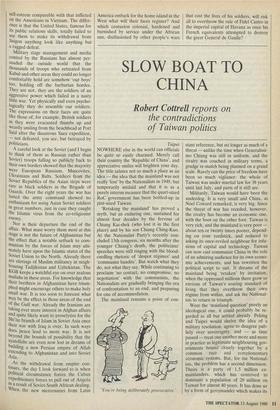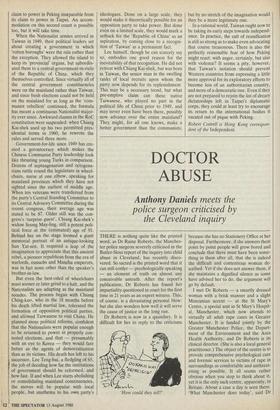SLOW BOAT TO CHINA
Robert Cottrell reports on
the contradictions of Taiwan politics
Taipei NOWHERE else in the world can officials be quite so easily charmed. Merely call their country the 'Republic of China', and appreciative smiles will brighten your day. The title salutes not so much a place as an idea — the idea that the mainland was not really 'lost' by the Nationalists in 1949, but temporarily mislaid and that it is as a purely interim measure that the quart-sized RoC government has been bottled-up in pint-sized Taiwan.
`Retaking the mainland' has proved a myth, but an enduring one, sustained for almost four decades by the fervour of Chiang Kai-shek (who lost it in the first place) and by his son Chiang Ching-Kuo. At the Nationalist Party's recently con- cluded 13th congress, six months after the younger Chiang's death, the politicians' speeches were still ringing with the blood- curdling rhetoric of 'despot regimes' and `communist bandits'. But watch what they do, not what they say. While continuing to proclaim 'no contact, no compromise, no negotiation' with the communists, the Nationalists are gradually bringing the era of confrontation to an end, and preparing for one of accommodation.
The mainland remains a point of con- `You're being deliberately provocative.' stant reference, but no longer as much of a threat — unlike the time when Generalissi- mo Chiang was still in uniform, and the rivalry was couched in military terms, a grudge re-match being planned on a grand scale. Rarely can the price of freedom have been so much vigilance: the whole of Taiwan was under martial law for 38 years until last July, and parts of it still are.
Militarily, Taiwan would have been the underdog. It is very small and China, as Noel Coward remarked, is very big. Since the threat of war has receded, however, the rivalry has become an economic one, with the boot on the other foot. Taiwan is very rich, and the mainland is very poor about ten or twenty times poorer, depend- ing on your yardstick, and reduced to asking its once-reviled neighbour for infu- sions of capital and technology. Taiwan can now cast communist China in the role of an admiring audience for its own econo- mic achievements, and has rewritten the political script to suit. It dreams of the mainland being 'retaken' by invitation, when the oppressed millions there grow so envious of Taiwan's soaring standard of living that they overthrow their own regime from within, and ask the National- ists to return in triumph.
Were the 'mainland question' purely an ideological one, it could probably be re- garded as all but settled already. Peking and Taipei would shelve the idea of a military resolution, agree to disagree pub- licly over sovereignty, and — as time passed — treat one another more and more in practice as legitimate neighbouring gov- ernments bound closely together by a common race and complementary economic systems. But, for the National- ists, the problem has a second dimension. Theirs is a party of 1.5 million ex- mainlanders, which has contrived to dominate a population of 20 million on Taiwan for almost 40 years. It has done so by a form of gerrymander which makes its claim to power in Peking inseparable from its claim to power in Taipei. An accom- modation on this second count is possible too, but it will take time.
When the Nationalist armies arrived in Taiwan in 1949, their political leaders set about creating a government in which `rotten boroughs' were the rule rather than the exception. They allowed the island to keep its 'provincial' organs, but subordin- ated them to a central-government-in-exile of the Republic of China, which they themselves controlled. Since virtually all of the central government constituencies were on the mainland rather than Taiwan, and since fresh elections could not be held on the mainland for as long as the 'com- munist rebellion' continued, the formula has meant a continuous Nationalist major- ity ever since. Awkward clauses in the RoC constitution were suspended: when Chiang Kai-shek used up his two permitted pres- idential terms in 1960, he rewrote the rules and served three more.
Government-for-life since 1949 has cre- ated a gerontocracy which makes the Chinese Communist Party leadership look like thrusting young Turks in comparison. Dozens of septuagenarian and octogena- rians rattle round the legislature in wheel- chairs, nurse at one elbow, speaking for mainland provinces which they have not sighted since the earliest of middle age. When ten veterans were transferred from the party's Central Standing Committee to its Central Advisory Committee during the recent congress, their average age was stated to be 87. Older still was the con- gress's 'surprise guest', Chiang Kai-shek's widow Soong May-ling, still a potent poli- tical force at the (estimated) age of 91. Behind her on the stage loomed a giant memorial portrait of an antique-looking Sun Yat-sen. It required a leap of the imagination to appreciate that this ancient rebel, a pioneer republican from the era of warlords, eunuchs and Manchu emperors, was in fact none other than the speaker's brother-in-law.
But even the best-oiled of wheelchairs must sooner or later grind to a halt, and the Nationalists are adapting as the mainland recedes. The process began with Chiang Ching-kuo, who in the 18 months before his death lifted martial law, tolerated the formation of opposition political parties, and allowed Taiwanese to visit China. He planned more political reforms, confident that the Nationalists were popular enough to be returned to power in properly con- tested elections, and that — presumably with an eye to Korea — they would fare better as the agents of democratisation than as its victims. His death has left to his successor, Lee Teng-hui, a fledgling of 65, the job of deciding how far the institutions of government should be reformed, and how fast. If and when Lee starts abolishing or consolidating mainland constituencies, the moves will be popular with local people, but anathema to his own party's ideologues. Done on a large scale, they would make it theoretically possible for an opposition party to take power. But done even on a limited scale, they would mark a setback for the 'Republic of China' as an aspiration, by coming close to a recogni- tion of 'Taiwan' as a permanent fact.
Lee himself, though he can scarcely say so, embodies one good reason for the inevitability of that recognition. He did not retreat with Chiang Kai-shek, but was born in Taiwan, the senior man in the swelling ranks of local recruits upon whom the party now depends for its replenishment. This may be a necessary trend, but what pre-emptive claim can these native Taiwanese, who played no part in the political life of China prior to 1949, and may never even have been there, possibly now advance over the entire mainland? They might, for all one knows, make a better government than the communists; but by no stretch of the imagination would they be a more legitimate one.
In a rational world, Taiwan ought now to be taking its early steps towards independ- ence. In practice, the cult of reunification is still so strong as to make even advocating that course treasonous. There is also the perfectly reasonable fear of how Peking might react: with anger, certainly, but also with violence? It seems a pity, however, that Taiwan's isolation should prevent Western countries from expressing a little more approval for its exploratory efforts to become less of an authoritarian country, and more of a democratic one. Even if they are not prepared to rejoin the list of dreary dictatorships left in Taipei's diplomatic corps, they could at least try to encourage its return to the international bodies it vacated out of pique with Peking.
Robert Cottrell is Hong Kong correspon- dent of the Independent.























































 Previous page
Previous page